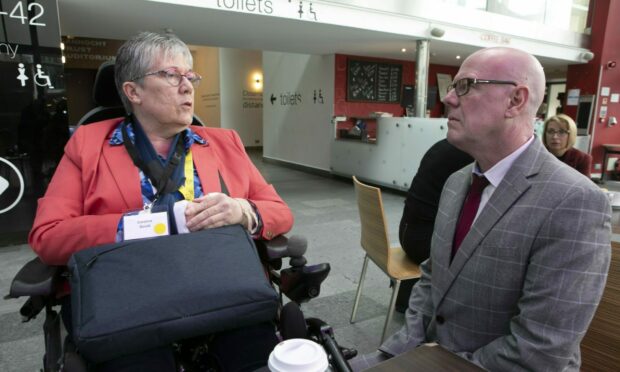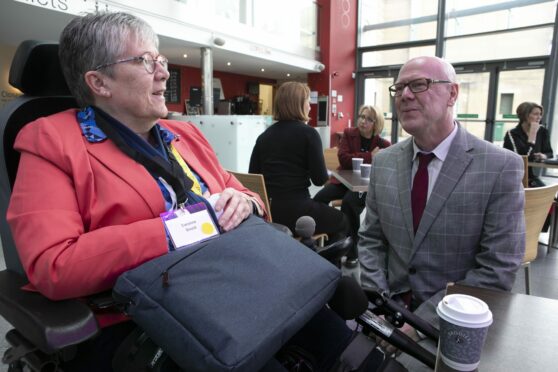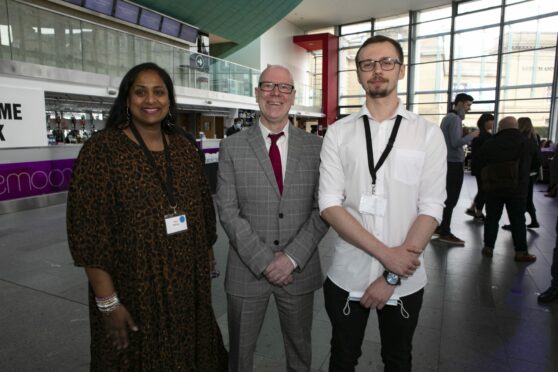The Scottish Government is being told to make sure its new National Care Service works for people living in rural areas – not just those in the central belt.
It is hoped the new National Care Service will completely reform how social care is given in Scotland by bringing social care services under a national body in a similar way to the NHS.
And those who receive care, carers, and those working in the care sector were at a summit in Perth to tell the government what things they want and need to see in this new service.
Dr Caroline Gould, from Broadford on the Isle of Skye, was at the event and said too often those making the decisions do not consider how different things are in the Highlands and Islands.
Others also said they want to make sure carers are not overlooked when designing this service, and to make sure the jobs are well paid and flexible.
They don’t always grasp how remote and rural areas work so differently.
– Dr Caroline Gould
Dr Gould, who is an independent wheelchair user, said she wants to ensure the government has no central belt bias when designing the service.
Her condition – type three ehlers-danlos syndrome – means her soft tissue gives way and her joints become dislocated – she can experience up to 50 dislocations every day.
She said: “Very often decision makers are in the central belt and when they make decisions they assume what works in urban areas will also work in remote and rural areas.
“And very often that is not the case.
“They don’t always grasp how remote and rural areas work so differently.”
Dr Gould also advises NHS Highland on disability provision, and said she wants to make sure accessibility is at the forefront of designing the new National Care Service.
She said she often finds she cannot find accessible toilets or there are no accessible inpatient or visitor facilities in places like Raigmore Hospital in Inverness and Broadford Hospital on Skye.
She added: “We shouldn’t be punished for having a disability.
“Patients are told to get up and be as independent as possible with things like showering, washing, getting dressed and moving about, but when it comes to independent wheelchair users they don’t always have the facilities for that.
“What then happens is they get lifted or carried and for people like me that can cause injuries.”
Focus on care givers
Others at the summit said the new care service must also work for those who are carers or work in the care sector.
Rani Melrose, from Scone, is a full-time carer for her son and works at Perth Minority Communities Association.
She said: “A lot of attention is placed on the person that gets the care, and not so much on the care giver.
“Care givers are often overlooked, and a little more attention should be given to them.”
She was joined by Michal Korytko, from Perth, who said he was there because he wants to get a career in the care sector.
He wants to make sure there are good career opportunities that are flexible to attract people to work in the reformed care service.
‘History made’
More than 500 people attended the summit, and Social Care Minister Kevin Stewart said their input means they “will write their names in the history books”.
Mr Stewart said: “This is the biggest reform of public services since the formation of the National Health Service.
“A change of this scale will take time if we are to get it right.
“The sooner we start, the sooner we will be able to deliver better support for everyone.”
He added: “The voices of those with lived experience have to be at the heart of the National Care Service.
“It is imperative we listen to them.”
He conceded there will always be a need for some to travel for their care, but aims to deliver as much local provision as possible
And he wants to make social care a more attractive career choice.
“People, particularly younger people, want to see a career in which they can progress,” he said.
“We need to put in place career progression to attract more folk into social care so we can grow the workforce for the future.”
NHS Highland defends claims
A spokeswoman for NHS Highland said all their new facilities, including Broadford Hospital, fully meet the required legal standards for accessibility.
They added: “While older buildings will have met the required standards at the time they were built, we recognise that the needs of disabled people have evolved over time, for example as wheelchair sizes have increased they need more space to manoeuvre.
“While we are not in a position to replace all out buildings, improving accessibility is built into any refurbishment projects which must meet modern standards.”
They added anyone who experiences accessibility difficulties at their sites should speak to a member of staff or contact NHS Highland’s feedback team.


